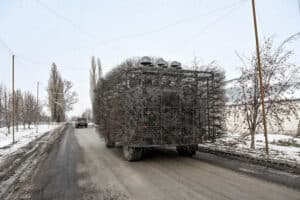The Reserve Bank is not the only organisation worried about possible sanctions if South Africa continues to be perceived as pro-Russia.

Many organisations share the South African Reserve Bank’s (SARB) concerns about sanctions that could follow the country’s adamant stance of neutrality towards Russia in the Ukraine war.
Cas Coovadia, CEO of Business Unity South Africa (Busa), says Busa agrees fully with the serious concerns the SARB raised about the potential trade, foreign exchange, investment and correspondent banking relationships impacts of government’s stance on Russia vis-à-vis the country’s biggest trading and investment partners, the USA, EU and UK.
“We have urged government to take a clearer non-aligned stance and consider the potential economic, trade and investment impact of supporting Russia, particularly within the context of the Russia-Ukraine conflict. We have pointed out, as evidenced by the SARB, that South Africa’s trade and investment with Russia are miniscule and particularly so when compared to those between SA, USA, UE, UK and the G7.”
Wayne Duvenage, Outa CEO, says his organisation also shares the SARB’s concerns.
“It is evident that our trading partners in the USA and Europe are dissatisfied with the South African government’s association with Russia.”
He says numerous investment entities have also voiced similar concerns.
“What worries us is the apparent lack of concern our government displays regarding these negative repercussions. The significant capital investment flight is a clear indication of the potential consequences that lie ahead. Yet, government’s lack of response to this issue further reinforces the impression that there is little consideration for the unfolding situation.”
ALSO READ: Reserve Bank warns sanctions could threaten financial stability
Crucial for government to take warning seriously
Duvenage says it is crucial for government to take these warnings seriously and engage in proactive dialogue with its trading partners and investment entities to address their concerns.
“It is in the best interest of the country’s financial stability and long-term prosperity to foster a constructive relationship with the international community and ensure that potential risks are mitigated through strategic and prudent decision-making.”
Jee-A van der Linde, senior economist at Oxford Economics Africa, points out that the Rand was falling again today due to reputation risks.
“The South African rand tends to be a barometer for emerging market risk, but idiosyncratic factors have overshadowed this. The rand sell-off arguably outpaced a potential deterioration in underlying fundamentals, but reputational risks via the external trade channel suggest that the local unit remains vulnerable to further depreciation.”
Prof. Bonke Dumisa, an independent economist, says South Africa is in a very serious Catch-22 ethical, political and economic dilemma, mostly due to South Africa’s unnecessary own goals.
“South Africa must realistically and pragmatically weigh the cost of saying South Africa is non-aligned on the issue of the Russia-Ukraine conflict, where those who are pro-Ukraine simply say South Africa is pro-Russia.”
He says the US is one of South Africa’s major foreign trading partners and we benefit significantly from AGOA, which the USA is now threatening to use against South Africa as direct punishment for being perceived as pro-Russia.
“On the other hand, we have very little trade with Russia. Our relationship with Russia is mostly a sentimental one that Russia supported the South African black liberation struggle against apartheid. It is therefore a question of economic realities vs national sovereignty based on sentiments and more to lose economically.”
ALSO READ: Non-aligned does not mean neutral in ANC speak
If it happens, sanctions will have a profound impact
Prof. Hugo Pienaar, chief economist at the Bureau for Economic Research at Stellenbosch University, says SARB governor Lesetja Kganyago said the people at the central bank’s financial stability department are paid to worry.
“Although the imposition of secondary sanctions by the US on South Africa is by no means a given, it is a new risk that emerged over the last several weeks. If this risk materialises, it will have a profound impact on the South African financial sector, as well as the broader economy. Therefore, it is appropriate that the Sarb flagged it.”
Angelika Goliger, chief economist at EY Africa, says it must be noted that there are many types and degrees of sanctions that could be implemented and the Financial Stability Review expands upon the worst-case scenario of a comprehensive country-wide sanction in its systemic event analysis.
“If Europe and the US do decide to impose secondary sanctions against South Africa and other countries, typically the EU or US would focus on targeting specific individuals or companies through travel bans and /or asset freezes.”
However, she says, even such targeted sanctions could put financial interactions with South Africa under even closer scrutiny, as the Sarb highlights.
“This is not a path we want to go down and the potential economic risks are clear. Amongst all the complex challenges we face, being more careful in how we engage at a geopolitical level is an easy ‘win’.”
Support Local Journalism
Add The Citizen as a Preferred Source on Google and follow us on Google News to see more of our trusted reporting in Google News and Top Stories.






